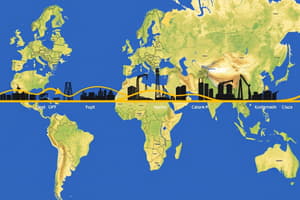Podcast
Questions and Answers
The availability of advanced medical treatments in a foreign country never motivates individuals to migrate, as healthcare is universally accessible.
The availability of advanced medical treatments in a foreign country never motivates individuals to migrate, as healthcare is universally accessible.
False (B)
An individual entering a country with a valid visa but overstaying beyond its expiration is not considered an instance of illegal migration.
An individual entering a country with a valid visa but overstaying beyond its expiration is not considered an instance of illegal migration.
False (B)
Economic motivations for migration are limited to seeking higher wages, with no consideration for entrepreneurial opportunities or escaping poverty.
Economic motivations for migration are limited to seeking higher wages, with no consideration for entrepreneurial opportunities or escaping poverty.
False (B)
Climate change solely results in gradual environmental degradation and does not instigate immediate displacement or migration.
Climate change solely results in gradual environmental degradation and does not instigate immediate displacement or migration.
Political persecution and armed conflict typically result in internal displacement, rarely leading to individuals seeking asylum in other countries.
Political persecution and armed conflict typically result in internal displacement, rarely leading to individuals seeking asylum in other countries.
Family reunification is an insignificant factor in global migration patterns.
Family reunification is an insignificant factor in global migration patterns.
'Brain drain' refers to the emigration of highly skilled professionals from their home country to persecute individuals abroad.
'Brain drain' refers to the emigration of highly skilled professionals from their home country to persecute individuals abroad.
Migrants and refugees are primarily motivated by a desire for material wealth rather than personal fulfillment and self-actualization.
Migrants and refugees are primarily motivated by a desire for material wealth rather than personal fulfillment and self-actualization.
Persecution based on political beliefs is not a significant factor driving individuals to migrate in search of safer living locations.
Persecution based on political beliefs is not a significant factor driving individuals to migrate in search of safer living locations.
The Northern Triangle countries of Guatemala, Honduras, and El Salvador are characterized by low levels of crime and violence, making them safe havens for their populations.
The Northern Triangle countries of Guatemala, Honduras, and El Salvador are characterized by low levels of crime and violence, making them safe havens for their populations.
Economic migration typically involves movement from wealthier, more developed areas to poorer, less developed regions in search of lower living costs.
Economic migration typically involves movement from wealthier, more developed areas to poorer, less developed regions in search of lower living costs.
Environmental factors leading to migration are always voluntary, as individuals have full control over their exposure to environmental hazards.
Environmental factors leading to migration are always voluntary, as individuals have full control over their exposure to environmental hazards.
Crop failure primarily leads to increased food availability and a surge in agricultural job opportunities, discouraging migration to urban areas.
Crop failure primarily leads to increased food availability and a surge in agricultural job opportunities, discouraging migration to urban areas.
Social factors influencing migration are limited to economic considerations, with little regard for educational opportunities or personal well-being.
Social factors influencing migration are limited to economic considerations, with little regard for educational opportunities or personal well-being.
Migration decisions are solely based on individual needs, with no consideration for family welfare or the desire to provide better opportunities for children.
Migration decisions are solely based on individual needs, with no consideration for family welfare or the desire to provide better opportunities for children.
Flashcards
Illegal Migration
Illegal Migration
Entering or remaining in a country without legal authorization.
Illegal Entry
Illegal Entry
Entering a country without proper inspection by immigration officials.
Visa Overstay
Visa Overstay
Staying in a country after the allowed visa period has ended.
Fraudulent Entry
Fraudulent Entry
Using fraudulent documents to enter a country.
Signup and view all the flashcards
Economic Migration
Economic Migration
Seeking improved living conditions and opportunities in a new location.
Signup and view all the flashcards
Environmental Migration
Environmental Migration
Migration caused by environmental factors like droughts and floods.
Signup and view all the flashcards
Refugee Migration
Refugee Migration
Migration resulting from persecution, conflict, or human rights abuses.
Signup and view all the flashcards
Migration
Migration
Movement of people from one place to another, often driven by safety, economic, environmental, or social factors.
Signup and view all the flashcards
Safety-Driven Migration
Safety-Driven Migration
Migration due to threats like persecution, discrimination and war.
Signup and view all the flashcards
Northern Triangle
Northern Triangle
The Northern Triangle refers to Guatemala, Honduras, and El Salvador, known for high violence and gang activity.
Signup and view all the flashcards
Social Migration
Social Migration
Migration for better living conditions, education, or career growth.
Signup and view all the flashcards
Displacement
Displacement
The forced movement of people due to social or environmental factors.
Signup and view all the flashcards
Crop Failure Migration
Crop Failure Migration
When crops fail, people often migrate to find food and jobs.
Signup and view all the flashcardsStudy Notes
- Migrants and refugees, including children, women, and men, leave their homes for various reasons, seeking knowledge, possessions, and an improved life.
Safety Factors
- Safety factors, such as persecution and discrimination based on nationality, race, religion, political beliefs, or group membership, can cause people to migrate.
- Individuals seek safer locations where they can have freedom over their lives, moving to escape danger imposed by war or gang activity
- In 2016, Guatemala, Honduras, and El Salvador, known as the Northern Triangle, were among the world's most violent regions.
- These countries experience thousands of crimes by local and international gangs, with most crimes going unpunished
- Approximately 10% of the Northern Triangle's population has already left, and more are expected to flee due to extreme violence.
Economic Factors
- A commonly cited reason for migration is economic factors, whether permanent or seasonal.
- People tend to migrate from poorer developing areas to richer areas where wages are higher and more jobs are available.
- People from rural areas move to more competitive urban areas to find additional opportunities
Environmental Factors
- Migration caused by environmental factors is increasingly involuntary, resulting in displacement or forced movement due to social or environmental factors.
- Crop failure often leads to food scarcity and a decline in agricultural jobs, prompting people to seek better job opportunities and climate.
- Pollution of water, air, and soil in both urban and rural areas poses health risks, compelling people to seek better living conditions.
Social Factors
- Social factors are based on the human desire to achieve a better quality of life.
- Migrants often seek better opportunities for themselves or their families, such as safer schools or jobs with sufficient salaries, benefits, and career prospects.
- United States graduate programs attract talented individuals in regards to education
- Individuals may migrate to access services like life-saving surgery and medical treatment unavailable in their home area.
Illegal Migration
- Illegal migration refers to people entering or staying in a country without legal permission, also known as illegal immigration or undocumented immigration.
- Examples of illegal migration:
- Entering a country lacking an immigration inspection
- Entering a country with an expired visa
- Entering a country fraudulently
- Crossing a border without using the proper channels
- Remaining in a country after a visa expires
Key Points of Migration Causes
- Economic drivers are a significant factor, with people moving to areas with better-paying jobs, business opportunities, or to escape poverty.
- Environmental factors include climate change events like rising sea levels, droughts, and extreme weather, forcing people to leave their homes for safer areas.
- Political factors involve persecution, human rights abuses, and armed conflict, leading to large-scale forced migration as people seek asylum in other countries.
- Social factors include family reunification, where people move to join family members already living in another country.
Specific Examples of Migration
- Labor migration: Moving to a new country to work in a specific industry with high labor demand
- Brain drain: Highly skilled professionals leaving for better opportunities abroad
- Refugee migration: Fleeing war or persecution and seeking asylum in another country
- Internal migration: Movement within a country, often due to economic disparities between regions
- Climate change migration: People displaced from their homes due to extreme weather events caused by climate change
Studying That Suits You
Use AI to generate personalized quizzes and flashcards to suit your learning preferences.



